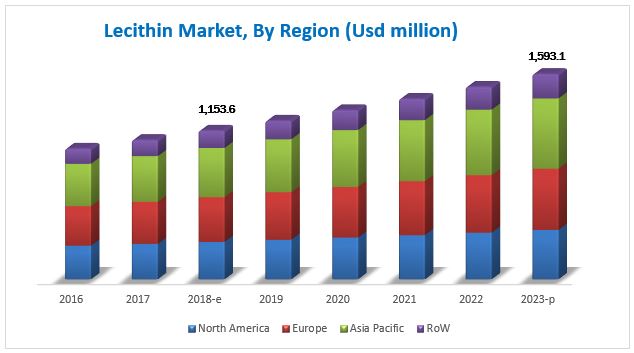The global lecithin market was valued at USD 1.15 billion in 2018 and is projected to reach USD 1.59 billion by 2023, at a CAGR of 6.7% during forecast period. The global phospholipids market was valued at USD 3.23 billion in 2018 and is projected to reach USD 4.36 billion by 2023, at a CAGR of 6.2% during the forecast period. The lecithin market is driven by the increased demand for lecithin in feed and food applications while the phospholipids market is driven by the growing trend towards consumption of natural ingredients in cosmetics and dietary supplements around the globe.
In 2018, Asia Pacific is estimated to occupy the largest share of the global lecithin & phospholipids market, in terms of value and volume. Export opportunities of non-GMO lecithin from countries such as India to the European market is expected to drive the lecithin market in the region. Sonic Biochem Extractions and Shankar Soya Concepts are some of the key players based in India offering non-GMO lecithin to the European market. Apart from this, the booming aquaculture industry in China is expected to boost the demand for lecithin in the feed segment. On the other hand, increased demand for personal care products and cosmetics in countries such as Japan and South Korea is expected to drive the phospholipids market in the region.

GMO concerns are the major factor restraining the growth of the lecithin market, globally. Allergies associated with soy are another major challenge faced by consumers, impacting the growth of the lecithin market.
The market is dominated by key players such as Cargill (US), ADM (US), Stern-Wywiol Gruppe (Germany), DowDuPont (US), and Bunge (US). Other companies include Lipoid (Germany), Wilmar International (Singapore), Sonic Biochem Extractions (India), Avanti Lipids Polar (US), Lecico (Germany), VAV Life Sciences (India), Sodrugestvo (Luxembourg), Kewpie (Japan), Sojaprotein (Serbia), American Lecithin Company (US), Sime Darby Unimills, Lecital (Austria), and Lasenor Emul (Spain).
